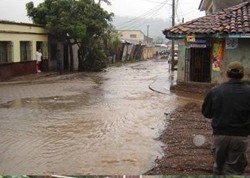
Hurricane Mitch caused severe damage and killed thousands of Hondurans in October 1998. The government was unprepared for the intense rains, catastrophic flooding, and mudslides caused by the category five hurricane. There was a critical vacuum in the country’s disaster response and preparedness capacities. Lack of organization, infrastructure, basic emergency equipment, and guidelines prevented authorities from responding quickly and effectively. After the hurricane, USAID recognized a need to help the government develop a more robust disaster response mechanism.
USAID has been working with the government to strengthen its Permanent Emergency Commission (COPECO) by providing an upgraded early warning telecommunication system that links emergency response centers throughout the country. In addition, each regional office has created action plans and task assignments to be followed in future emergencies.
The training and strengthening of the regional centers were tested in October 2005, when Tropical Storm Stan and Hurricane Beta hit Honduras. The emergency commission responded quickly and effectively to both storms. Key to monitoring the threat were the satellite-transmitted stream flow and rainfall data from stations that USAID installed throughout the country. Based in part on this data, the commission issued timely alerts and bulletins to the public. Response officials coordinated with the media to inform the public about the storms and response plans.
“Tropical Storm Stan was an excellent exercise. It gave us time to prepare and the media cooperated very well with us. We are very satisfied with the positive and successful response,” said Hugo Arévalo, the COPECO Sub-Commissioner at the time. During the storm, response teams evacuated 8,162 persons from areas affected by flooding and landslides to temporary shelters where they received assistance. “Stan was a test in preparation for us … and people followed manuals and operational plans as trained by USAID,” recalled José Ramón Salinas, who was COPECO’s regional coordinator at the time. With USAID assistance and training, Honduras is now better prepared to minimize the destruction caused by natural disasters.







Comment
Make a general inquiry or suggest an improvement.